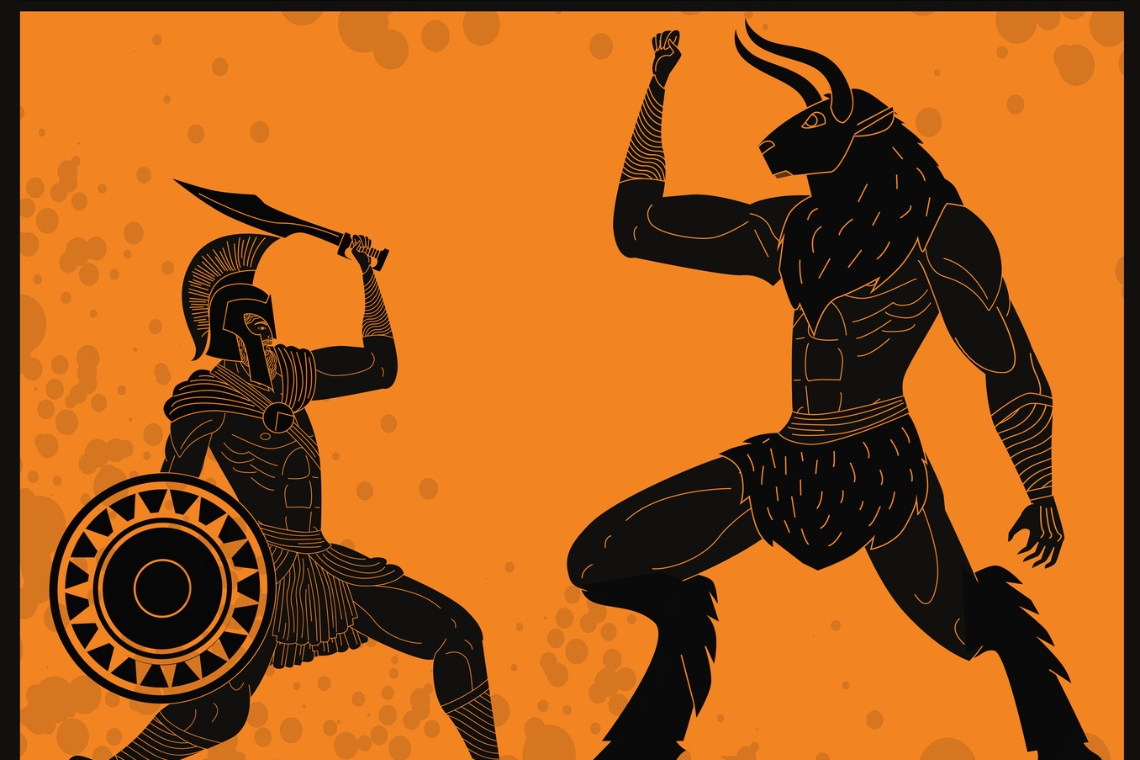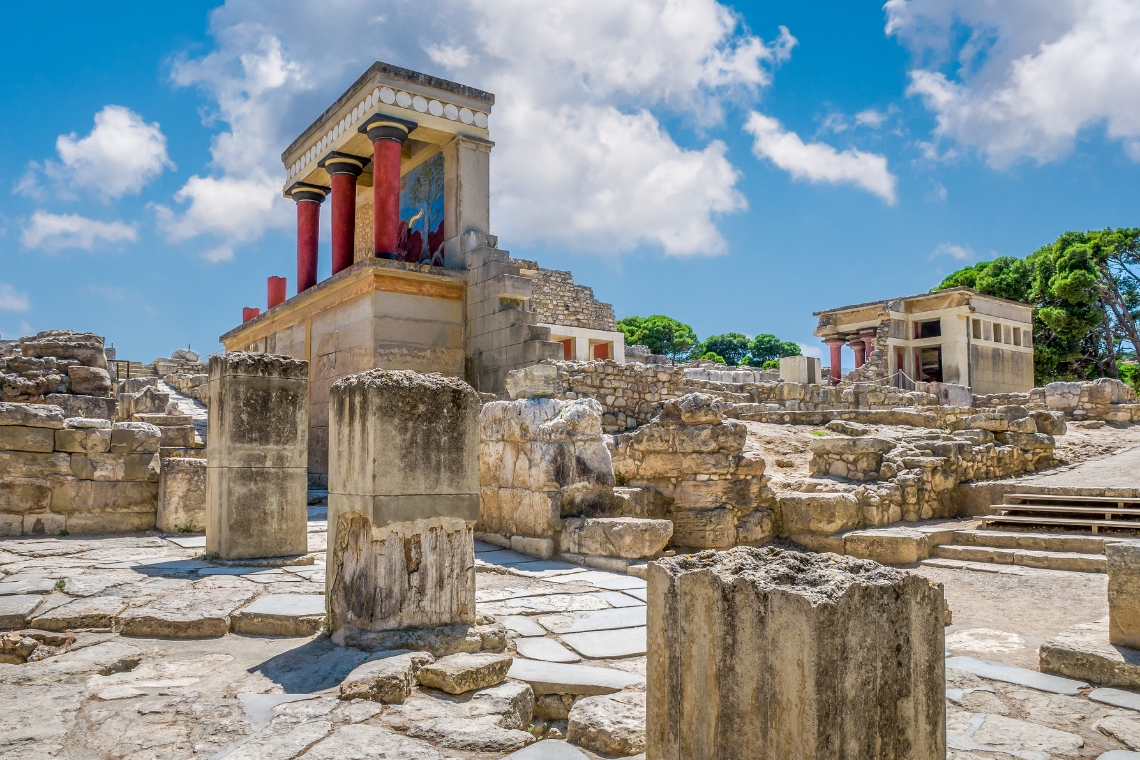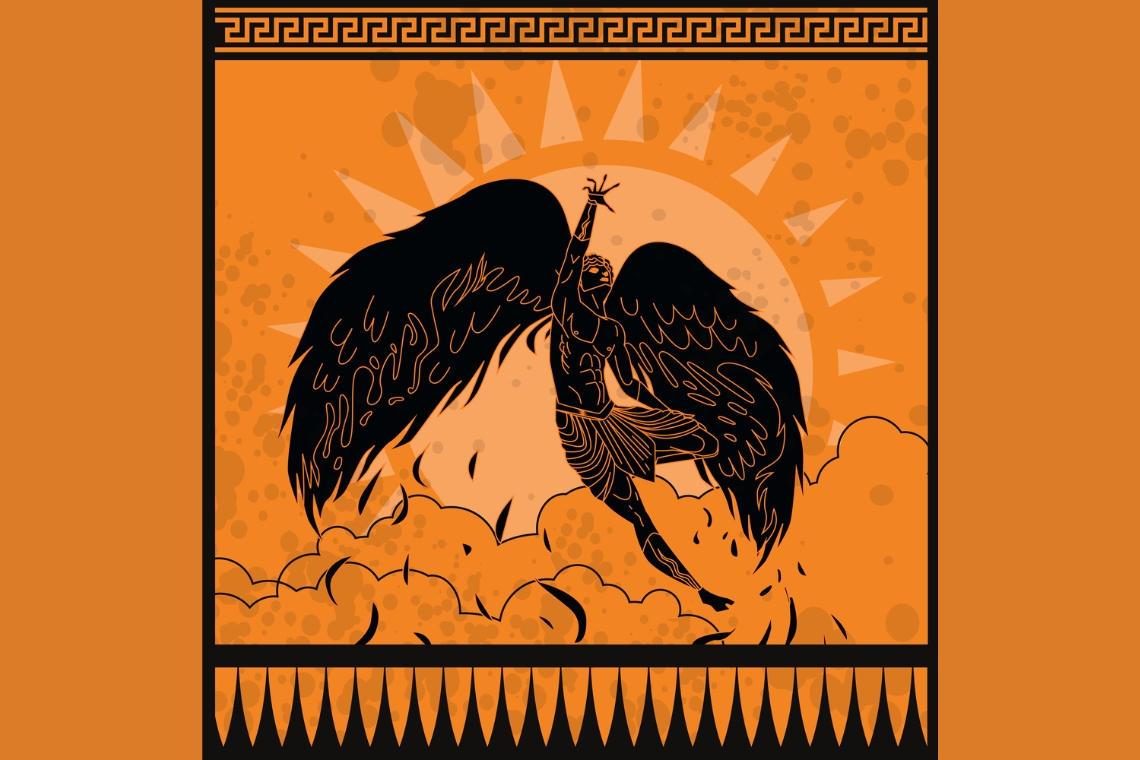7-Day Percy Jackson Mythology Trip
The myth of Daedalus and Icarus serves as an allegory about hubris and the importance of heeding the advice of those with knowledge and wisdom. It is a timeless lesson that remains relevant even in modern times and continues to inspire art and literature.
Lessons from Icarus in Greek Mythology

Theseus fighting the minotaur - Credits: Matintheworld/ DepositPhotos
As mentioned above, the story of Icarus in Greek mythology serves as a potent reminder of the consequences humans may face when they succumb to hubris or excessive pride. In a tale filled with caution, ambition, and tragedy, Icarus' flight towards the sun provides valuable insights into human nature.
Despite Daedalus' explicit warning not to fly too high, Icarus, intoxicated by the exhilaration of flight, ignored his father's advice and soared dangerously close to the sun. The scorching heat melted his wings, and he plummeted to his death in the sea.
From this heart-wrenching tale, several key lessons emerge.
- Beware of hubris: Overconfidence in one's abilities might lead to one's downfall, as displayed by Icarus' refusal to heed his father's warnings. Confidence should be balanced with humility and a willingness to listen to others' wisdom.
- The danger of unchecked ambition: The tragedy of Icarus highlights the potential perils of disregarding limitations in pursuit of lofty goals. Ambition, while driving success, can be a double-edged sword, requiring caution and self-awareness.
- The inevitability of consequences: Icarus' flight symbolizes the fact that choices come with consequences, and individuals must bear the outcomes of their decisions, regardless of ambition or desire.
In summary, the story of Icarus, steeped in Greek mythology, imparts timeless lessons about human nature and the potential pitfalls of pride, ambition, and recklessness. This cautionary tale serves as a poignant reminder to stay grounded while striving for greatness.
Daedalus and Icarus in the Context of Knossos, Crete
Historical Significance of Knossos
The Palace of Knossos, located on the island of Crete, has significant connections to Greek mythology, particularly the stories of King Minos, Daedalus, and Icarus. The palace itself was a marvel of ancient architecture, boasting 1,300 rooms and intricate frescoes. It is said that Daedalus designed the palace for King Minos, which included the infamous Labyrinth where the mythical Minotaur was imprisoned.
The Palace of Knossos is a must-see place when visiting Crete, as it provides a fascinating glimpse into the Minoan civilization and the legends that surround its history.
The Minoan Civilization

Knossos Palace Ruins at Crete Island - Credits: luliia/ Canva
The Minoan civilization was a Bronze Age society that flourished on Crete from around 3000 to 1100 BCE. Known for their advanced art, intricate architecture, and well-planned cities, the Minoans have been called Europe's first great civilization. The Palace of Knossos is perhaps the most famous symbol of this society, as it showcases the impressive feats of engineering and artistry achieved by the Minoans.
In the context of Greek mythology, the Minoan civilization played a prominent role in the legends that involved King Minos, Daedalus, and Icarus. It was here that Daedalus was said to have designed the complex Labyrinth for King Minos, a maze so sophisticated that it required divine aid for Theseus to navigate and defeat the Minotaur.
By exploring the history of Crete and the architectural wonders found at Knossos, we can gain a deeper understanding of the layers of myth and history that intertwine to create the rich tapestry of Greek mythology, and we can appreciate the lasting influence of the Minoan civilization.
Connections to Other Greek Myths
The story of Icarus is tightly connected to several other well-known figures and myths in Greek mythology. One major connection involves his father, Daedalus. Known as a master craftsman and inventor, Daedalus was responsible for designing the famous Labyrinth of Crete which trapped the half-man, half-bull creature known as the Minotaur.
Moreover, the tale of Theseus is intertwined with that of Icarus and Daedalus. Theseus, a legendary hero, ventured into the labyrinth to face the Minotaur. With the help of Ariadne, daughter of King Minos, he managed to slay the monstrous creature and escape. It is believed that Ariadne provided Theseus with a ball of yarn, which he unraveled as he navigated the labyrinth, finding his way back out. After Theseus' success, Minos suspected that Daedalus and Icarus were involved in helping him.
Icarus' story also bears connections to the literature of ancient Rome. The Roman poet, Ovid, included the myth of Icarus in his masterpiece, Metamorphoses. This epic poem, which explores themes of transformation, provides one of the most famous accounts of Icarus' downfall. Ovid's version of the myth emphasizes the tragic consequences of pride and disobedience.
Additionally, some interpretations of the Icarus myth draw connections to Apollo, one of the most important gods in Greek mythology. Apollo, depicted as the god of the sun, music, poetry, and prophecy, inadvertently played a central role in Icarus' demise. As Icarus soared too close to the sun, it was the sun god's heat that melted his wax wings, leading to his fatal fall.
3-day Percy Jackson Mythology Trip (small group or private)
Group Type
Small Group, Private
Finally, the figure of Apollodorus, a renowned classical scholar, is also relevant to the Icarus myth. Apollodorus compiled various myths in a work known as the Library, which has become one of the main sources for researching Greek mythology. His work provides valuable information about myths like that of Icarus, helping scholars better understand the interconnected stories of Greek gods and heroes.
Wrap Up
Icarus's tragic story serves as a timeless reminder of the perils of hubris. Even though his father, Daedalus, had carefully constructed wings from bird feathers and wax, Icarus could not resist the temptation to fly higher and closer to the sun. This act of defiance ultimately led to his demise as the sun's heat caused the wax in his wings to melt, making him plummet into the sea.
The myth is a representation of humanity's pursuit of greatness and the risks associated with it. In conclusion, Icarus's story provides profound insights on the potential pitfalls of ambition and pride. The myth serves as a reminder for individuals to remain grounded and be aware of their limitations, to tread cautiously when pursuing lofty goals, and to respect the forces of nature that govern our world.
FAQs
Who was Icarus in Greek mythology?
Icarus was a character in Greek mythology, the son of Daedalus, a skilled inventor and craftsman. He is best known for his tragic attempt to escape the island of Crete using wings crafted by his father. The story of Icarus is an enduring tale of hubris and the dangers of recklessness.
What is the story of Daedalus and Icarus?
In Greek mythology, Daedalus was a skilled inventor who, along with his son Icarus, was imprisoned by King Minos of Crete. To escape, Daedalus created wings made of feathers and wax for both himself and Icarus. He advised his son not to fly too high, as the sun would melt the wax, or too low, as the waves would dampen their wings. However, Icarus, caught up in excitement, ignored his father's warnings and flew too close to the sun, causing his wings to melt.
How did Icarus die?
Icarus met his tragic end when he failed to listen to his father's advice and flew too high, causing his wings to melt. As a result, he fell into the sea and drowned. The body of water where Icarus perished is now known as the Icarian Sea, named after him.
What is the moral of the story of Icarus?
The story of Icarus serves as a cautionary tale about the potential consequences of hubris and disobedience. It emphasizes the importance of respecting and following advice, especially from those with more wisdom and experience, as well as recognizing the dangers of overconfidence.
What does Icarus symbolize in mythology?
Icarus represents the dangers of recklessness, overconfidence, and the consequences of failing to heed warnings. His story is a timeless reminder of the importance of maintaining a balance between ambition and caution, as well as the perils of disregarding wisdom and guidance.


